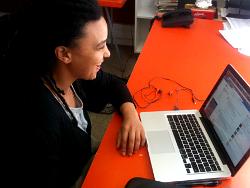The world is changing. Many of us lead parallel lives, one in our physical bodies, and one or more as digital entities. As resistant as many are to this phenomenon, it is very real and here to stay.

So scoffers, scoff on. Facebook is reality, twitter is reality, and YouTube is reality. They certainly are different realities compared with a walk on Table Mountain, a meal at a restaurant with friends, or a war, which engage more of the senses, but not only are these digital platforms ‘places’ where people live, they intersect with the physical realm as well.
Social media and change
Around the world, over 90% of non‐profits have a social media component – a higher percentage than the world’s businesses. Non‐profits are usually interested in change, and change is a process. The behaviour change process is often described as the journey from being unaware of a problem, to aware of it, to actively working to change that problem, sustaining that change, and then advocating that behaviour and change process to those around oneself.
This means that we want to reach people not only at the points where we encourage them to start a process of change, like at workshops, but also in their daily lives, to remind them of the change that we collectively seek and to encourage and support them to sustain positive behaviour, and give them an opportunity to share that change.
Although South Africans live, work and play in vastly different areas and establishments across the country, over 4.5 million SA citizens have a Facebook profile, and well over 55,000 South Africans have active twitter accounts.
Sonke: a network
As well as engaging the individuals one-on-one in our community, Sonke Gender Justice is a network. This means that we recognize that the far‐reaching change we want to see in our local communities, our country, Africa, and the world, cannot happen if we are alone in our mission. We need like‐minded friends and partners to work towards a common goal.
Social media sites are also called social networking sites. Technically, the social media part is the stuff that we share on Facebook, twitter, YouTube, etc: the statuses, the videos, the photos of grandma dancing at her 90th birthday party. The networking definition refers to the people you can connect with. When we receive updates from and are in digital relationships with our partners, we see the other projects they are working on and hear feedback from individuals and organizations who support them – in a way that calling them on the phone or meeting once a month could never do. From this information and network, we can grow, and collaboration is made easier. It is this networking aspect of social media that allows us to make a greater impact on the world by supporting our partners and being available to be supported by them in turn.
Sharing ideas
Two months ago, Sonke’s Cape Town communications team began participating in a (face‐to‐face!) network of communications staff from a variety of local HIV‐related NGOs. Our second meeting focused on our organizations’ use of social media. We found ourselves at different stages of life in our various digital lives, and we discussed ways to connect meaningfully using social media, to monitor our digital presence – and to measure its effect. That was the hard part.
As difficult as it is to measure impact at this point, we realized we have to accept that social media are here to stay, and that we have to make a strong effort to integrate them into our organisations’ practices. The most successful non-profits’ digital presences (in terms of securing donations though social media campaigns, and reach) are, overall, some of the oldest. This shows that persistence and maintenance of an online presence do pay off, but that using digital platforms for change takes time. It requires building a wide network of people who learn to trust the organization, and over time, feel personally connected. It is at this point that someone who likes the organization will share its updates on their own profiles and so forth, becoming an online advocate for our work and engaging those outside of our network.
After all, when we’re online, it doesn’t take much to share something that interests us; in fact, just surfing the net has become a social activity – we instantly share articles, pictures and videos from the website we’re on. This also means that digital spaces like Facebook and twitter are turning lay people into online activists who can have a real impact on their networks by sharing information, and heartfelt, personal opinions about critical issues.
Join us!
We’re currently using our Facebook and twitter accounts to share pertinent current affairs, have conversations with our supporters and to support and engage with like‐minded activists working towards the same goals of gender equality, human rights and reducing the spread and impact of HIV and AIDS. We have plans to start integrating Facebook communications into our projects on the ground – we want to post photos and updates about everything we get up to at Sonke. So watch this space!
*Please use our Facebook page to share your thoughts and feelings with us. We’d love to see you there.*
- facebook.com/sonkegenderjustice
- Twitter.com/SonkeTogether

